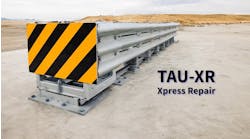The state of Tennessee has begun preparations to remove and replace the majority of the 1,700 Lindsay X-LITE guardrails on its roads system due to their alleged defectiveness. This decision has spurred further reports of traffic collision deaths caused by the guardrail in other states.
At least seven people have died in six crashes in Tennessee, Missouri and Virginia when their vehicles struck the guardrail ends, according to the Knoxville News Sentinel. In at least five of those crashes, the guardrails impaled vehicles along interstates with speed limits of 70 mph.
Since June 2016, X-LITE ends have penetrated three vehicles, killing four people in Tennessee. In two of those three crashes, the guardrails "did not perform as they were intended to," TDOT communications director B.J. Doughty said in the statement this week.
TDOT has found that the X-LITE model does not consistently telescope correctly when hit at speeds higher than 62.2 mph, the standard crash test speed for guardrail ends.
Instead, the guardrail ends separated horizontally from the W-beam guardrails, piercing vehicle cabins, according to a letter from TDOT Commissioner John Schroer to Pamela Kordenbrock, administrator of the Federal Highway Administration's Tennessee branch.
TDOT also found the installation instructions for terminals to be "unclear" regarding "a lack of bolt torque specifications," which "may cause installation deficiencies," the letter reads. Those deficiencies "could result in the terminal performing differently from the original tested conditions."
In other non-fatal crashes, TDOT found some guardrails failed to telescope but didn't pierce vehicles.
TDOT has begun accepting bids for contractors to remove and replace most of the 1,700 ends on state roads where speed limits exceed 45 mph. The contracts will be awarded, region by region, on or before April 30. The work is slated to be completed by June 30, 2018.



